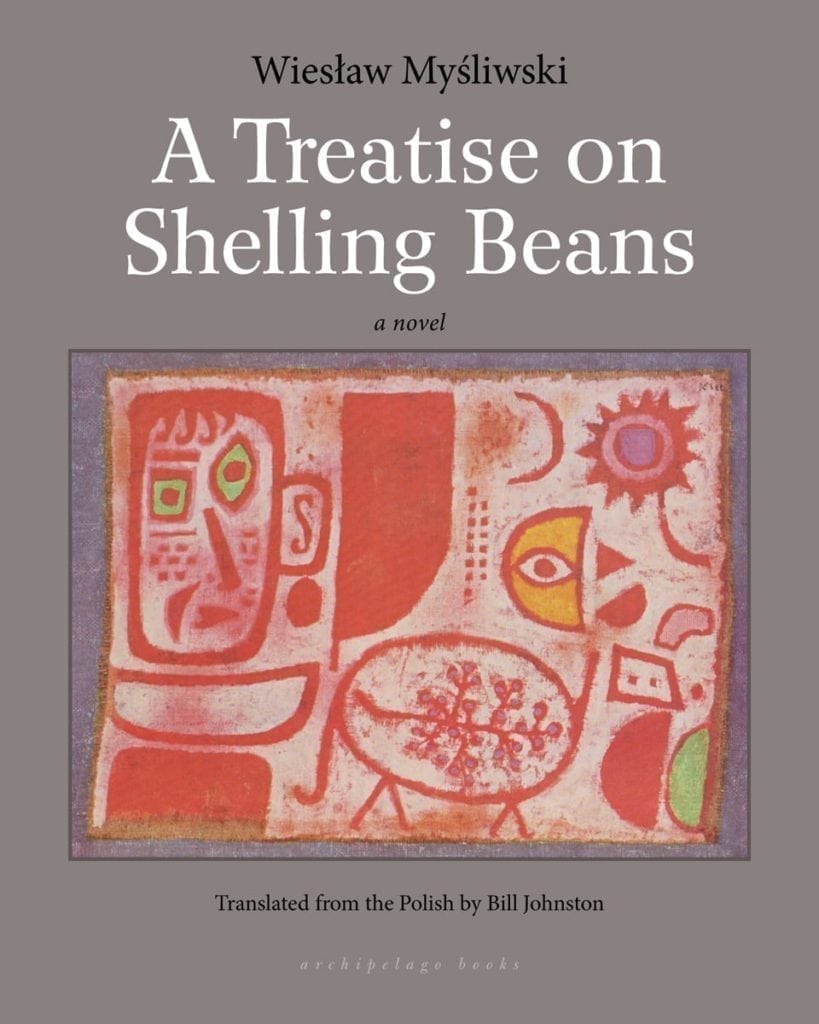Book Description
CLICK HERE TO READ AN EXCERPT FROM TRAFIKA EUROPE!
Our narrator, a retired musician, receives a visit from an enigmatic stranger who inspires him to share the story of his long and stormy life. We listen spellbound as he tells of a happy country childhood brutally cut short by World War II; harsh schooling in an institution for orphaned children; his experiences as an electrician on postwar building sites; life abroad playing saxophone in a dance band; and an eventual return to a childhood home transformed by the tempestuous century he has lived through. Replete with drama, mystery, wisdom, and humor, and told in the grand oral tradition of Mysliwski’s celebrated Stone Upon Stone, the novel’s masterfully interwoven stories and anecdotes build into a magnificent portrait of a man and his times. By turns poignant and hilarious, A Treatise on Shelling Beans is an epic recounting of a life that is anything but ordinary.
This chopped and fractured narrative is not the winking, postmodern self-consciousness but a capturing of the true way people tell their stories. Feeling at times like a confession, this is another masterstroke by the acclaimed Polish author Wiesław Myśliwski, that he captures what is normally haphazard improvisation with a grace that feels familiar, realistic, and controlled. His remarkable translator, Bill Johnston, matches him step for step.
— The Quarterly Conversation
An unforgettable voice. The tone of the narrator is highly amusing, human, and perceptive.
— Package
Stone Upon Stone, which was first published in 1984, appeared in translation from the indispensable Bill Johnston via the equally indispensable Archipelago Books. The novel won the PEN Translation Prize in 2012. In late 2013, Archipelago and Johnston released their second Myśliwski novel, A Treatise on Shelling Beans [...], which deserves as much attention, if not more.
— Los Angeles Review of Books
Praise for Stone Upon Stone:
Joyously anchored in the physical world, steeped in storytelling, a delight from start to finish.
— Kirkus Reviews, starred
Myśliwski never takes a false narrative step, because on this flowing narrative river of a road, there can be no such thing as a false step.
— The Quarterly Conversation
A seamless epic . . . Fresh and surprising . . . Polish poet Czeslaw Milosz said that the poem that praises beauty must swallow all of death, and Stone Upon Stone does just that: illuminating the balance of beauty and brutality that defines our existence. . . . When Szymek says, 'The whole world is one big language,' we believe it. We cup our ears to listen. . . . That Stone Upon Stone reads like the grand novel it is, not a novel in translation, is a testament to Johnston's work and Mysliwski's singular vision.
— Orion
A hymn in praise of life.
— Krysytna Dąbrowska
Stone upon Stone is the first masterpiece in Slavic literature, perhaps even in European literature, in which the fate of the peasant attains the standing of human fate in all its tragic vastness.
— Anna Tatarkiewicz
Like a more agrarian Beckett, a less gothic Faulkner, a slightly warmer Laxness, Mysliwski masterfully renders in Johnston's gorgeous translation (Mysliwski's first into English) life in a Polish farming village before and after WWII. . . . Richly textured and wonderfully evocative, the novel renders Szymus as a distinctly memorable character, whose humor and hard-earned wisdom lend beauty to a bleak vision of a land destroyed by war and ravaged by history, and whose voice--sometimes warm, sometimes ornery, always elegiac--is undeniably original, his digressions and ruminations forming a story that reminds us that 'words are a great grace. When it comes down to it, what are you given other than words?'
— Publishers Weekly, starred
A marvelous, garrulous book ... The grandest example of a genre ... Szymek's rustic voice narrates with a naivete and an eloquence that are equally endearing, reaching into every corner of the Polish countryside like a great shining sun.
— The National
Exhilarating . . . In long, streaming paragraphs, Szymek recounts a life that is full of sorrow and happiness. He talks about everything a life can contain: lovers, drinking, war, death, accidents, experience . . . A dizzying array of memories and stories.
— The Minneapolis Star Tribune
This 500+ page novel will reward the patient reader with a remarkably detailed understanding of postwar life in rural Poland and, by extension, the human condition in general.
— Publishing Perspectives
Szymek's rambling tales, with digression following digression until the chapter (and, eventually, the whole book) comes full circle, are entertaining and thought-provoking, whether they are stories of joyous drunken rampages or suspense-filled moments in the cold, Polish forests, waiting for the enemy to appear. In the end, it's a book about life - but one, that begins, and ends, with the inescapable image of a tomb...
— Tony Malone, Tony's Reading List
[Myśliwski's prose] is vividly concrete, blazing with precise physical details, and brusque (though never the less acute) even when it comes to thorny philosophical questions.
— Los Angeles Book Review
"The world of the novel, a mélange of chatty anecdote and metaphysical speculation, is in constant flux...The only firm element is the mesmerizing voice of the narrator, full of anecdote and wit and rumination...His esthetic is one of liberal inclusion, and his novel is stunningly rich in detail, encyclopedic...Beneath the speaker's casual tone is a profound vein of grief and skepticism dating from the early loss of family and home. All is imagination, illusion, and chance...The world is what is told,' he concludes, and he has told his story. And we are transformed by hearing it."— Lynne Sharon Schwartz

